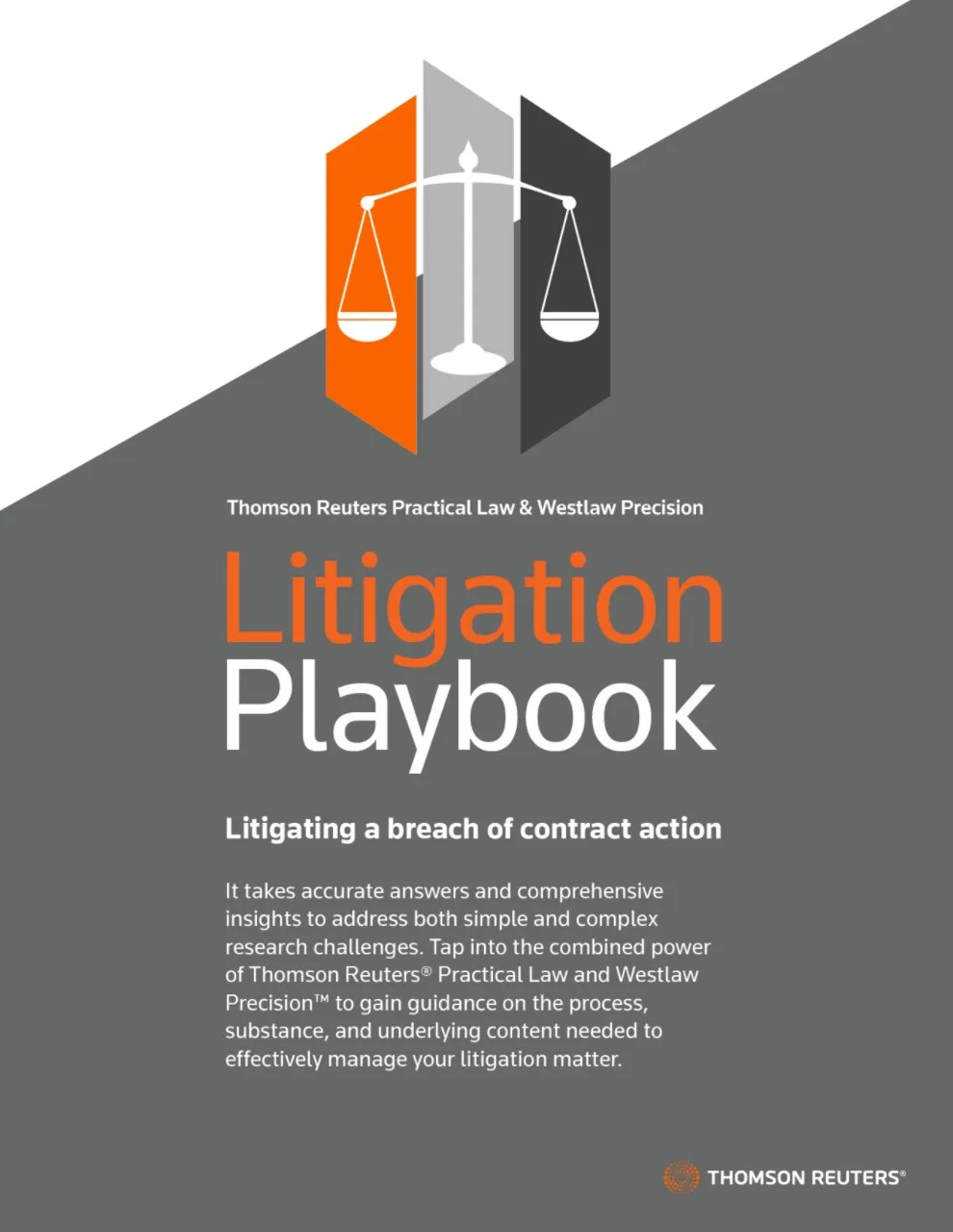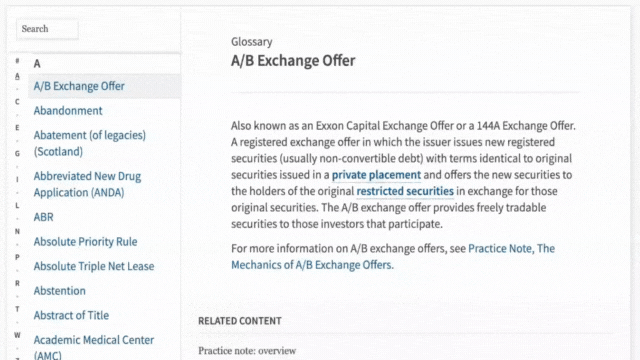Definition, types, processes, and how-to resources for litigators
← Legal terms • commercial litigation
Highlights
Differs from corporate litigation as it focuses on disputes within the business realm, such as contract disagreements and shareholder disputes.
Often goes beyond national boundaries, requiring lawyers to have cross-jurisdictional legal knowledge.
Complex commercial litigation involves intricate commercial transactions, such as partnership disputes, intellectual property disputes, and fraud cases.
Jump to ↓
| Is commercial litigation the same as corporate litigation? |
| Corporate and commercial law differences |
| Roles of commercial litigators |
| Commercial litigation market |
| Types of commercial litigation |
| Complex commercial litigation |

Playbook
Litigating a breach of contract action: The answers you need and how to proceed when litigating a matter.
Download free playbook ↗Commercial litigation refers to legal disputes between individuals, excluding criminal charges. In these cases, parties may sue to uphold or defend a legal right, with the suing party seeking compensation in monetary damages or specific performance. This field covers a spectrum of disputes within the business realm, ranging from contract disagreements to shareholder or partnership disputes.
Is commercial litigation the same as corporate litigation?
The terms’ corporate’ and ‘commercial’ law might seem interchangeable for those not well-versed in corporate commercial law, but they govern distinct aspects of a company’s operations.
Commercial and corporate litigation distinguish themselves from other forms of litigation, primarily by the entities involved. When businesses are parties to a dispute, the issues tend to be more specialized than traditional civil litigation. The nature of commercial litigation often leads to higher costs, attributed to extensive steps in the litigation process, notably discovery and the involvement of forensic experts.
Unlike other forms of litigation, commercial disputes frequently go beyond national boundaries, requiring commercial lawyers to possess cross-jurisdictional legal knowledge and an awareness of commercial laws in relevant jurisdictions.
Key differences between corporate and commercial law
Corporate law
Corporate law — or business, enterprise, or company law — primarily oversees high-level corporate governance, regulation, structuring, financing, and management. It deals broadly with corporate governance and finance, impacting companies of all sizes throughout their lifecycle, including:
- Incorporation and formation
- Restructuring/reorganization
- Capital raising
- Mergers, demergers & acquisitions
- Corporate governance
- Shareholders’ rights
- Dissolution or liquidation
Corporate law often transcends national borders due to the international nature of modern business, necessitating cross-jurisdictional legal knowledge. Corporate lawyers are crucial in large-scale transactions, conducting due diligence, negotiating agreements, and overseeing financial aspects.
Commercial law
Commercial law pertains to the day-to-day facets of business operations, focusing on trade, commercial transactions, and business deals. Unlike corporate law, commercial law is more expansive, covering various legal areas such as:
- Consumer law
- Contract law
- Intellectual property law
- International transactions and trade
- Employment and labor law
It must be understood that commercial law is contract law, where lawyers advise on negotiating contracts, drafting key documents, ensuring brand trademark protection, and shielding clients from liability.
Roles of commercial litigators
Commercial litigation attorneys help businesses navigate the complex legal landscape of business disputes. Their education, training, and experience are tailored to address the unique challenges presented by business-related litigation.
Whether representing commercial clients or individuals in such cases, these attorneys shoulder specific responsibilities. In the case of commercial clients, a commercial litigator may be involved in various high-stakes tasks, including conducting due diligence, negotiating agreements, and overseeing the financial aspects of large-scale transactions. On the other hand, in the case of individuals in commercial cases, litigators may focus on addressing issues such as breach of contract, business torts, civil RICO claims, and shareholder disputes.
Impact of today’s market on commercial litigation
Influenced by political changes, economic shifts, regulatory updates, and technological advancements, the legal landscape continually shapes the commercial litigation environment. As commerce and the market evolve, commercial litigation demand remains constant.
Emerging technologies bring new challenges, such as patent infringement and breach of online contracts, expanding the scope of commercial litigation. High-tech companies, often engaged in high-risk and high-dollar litigation, play a significant role in the growth of the commercial litigation practice area. These companies, driven by innovation and intellectual property concerns, are frequently at the forefront of legal battles.
Types of commercial litigation
Fraud
Fraud in commercial litigation refers to deceptive and dishonest practices that harm businesses or individuals financially. As businesses increasingly face complex and evolving challenges, the landscape of fraud litigation is continually shaped by dynamic trends.
A critical aspect is the heightened volume of fraud claims, indicating a growing awareness and pursuit of legal action in response to deceptive practices. Despite a reduction in claims issued in 2022, the overall trajectory demonstrates an increasing focus on addressing fraudulent activities through legal channels.
Business torts
Business torts are wrongful actions deliberately taken against a business to cause harm. These actions can result in various detrimental effects, such as lost profits, reputation damage, competitive advantage loss, and decreased market share. Business torts may be committed intentionally by competing businesses or arise from negligent behavior by individuals or other companies.
The primary purposes of tort laws related to business are to compensate the victim for losses incurred due to the wrongful action and deter future violations. Common types of business torts include:
- Tortious Interference: Involves deliberate and unlawful interference in a company’s contractual dealings or business relationships, potentially leading to a breach of contract.
- Restraint of Trade: This results in economic injury by impeding a business’s ability to conduct operations freely, encompassing activities that limit sales, trade, and interstate commerce.
- Injurious Falsehood: This involves intentionally making false statements to damage another business’s reputation, requiring proof of malice to establish the falsehood.
- Unfair Competition: When two businesses compete on unequal terms due to conditions favoring or disadvantaging certain competitors, preventing fair competition.
- Fraudulent Misrepresentation: This involves deliberate deception for unfair gain, encompassing acts such as gestures, half-truths, or silence to mislead another person or business.
Creditors’ rights
Creditors’ rights are the array of tools available to creditors for collecting outstanding debts from debtors. This is applicable in both bankruptcy and non-bankruptcy contexts, offering creditors avenues to protect their interests when faced with challenges in debt collection.
When debtors declare bankruptcy or default on payments without responding to collection efforts, understanding the rights afforded to creditors becomes paramount. The specifics of these rights and the tools at a creditor’s disposal can vary depending on whether bankruptcy proceedings are involved. Exercising creditors’ rights is time-sensitive. Delays in exercising these rights decrease the likelihood of successful debt recovery. In many cases, debtors struggle with cash flow issues, managing payments to multiple creditors simultaneously. Proactive creditors, often those who take timely action, increase their chances of being prioritized in receiving payments from the limited funds available to all creditors.
Intra-business disputes in commercial litigations
These are the conflicts within a business entity that necessitate legal intervention. These disputes commonly arise in:
- Shareholder disagreements
- Partnership conflicts
- Breaches of contracts
- Intellectual property disputes
- Employment issues
- Corporate governance conflicts, and
- Financial disagreements.
Shareholder disputes may involve governance or profit-sharing, while partnership disputes concern management or directional disagreements. Breaches of contracts, intellectual property conflicts, and employment disputes often lead to legal actions for resolution.
Corporate governance disputes focus on decision-making processes, and financial disagreements involve matters such as accounting practices. Resolving these disputes requires a structured legal process, including negotiation, mediation, arbitration, or court proceedings.
Shareholder derivative litigation
When an investor acquires stock in a corporation, they gain ownership rights. While the board of directors and executives manage daily operations, shareholders can, under specific circumstances, file a lawsuit on behalf of the corporation — known as a shareholder derivative action.
This legal action allows a shareholder to sue if the directors fail to pursue legitimate claims against those harming the company. Such suits often target officers, directors, accountants, or advisers for breaches of contract or fiduciary duty. Requirements for a derivative lawsuit vary by state law, with commonalities including the necessity for continuous ownership of company stock during the incident and resolution of the lawsuit. Shareholders must demonstrate efforts to alert the directors before filing, and court approval is typically mandatory for voluntary dismissal or settlement.
Breach of contract
Breach of contract is a significant aspect of commercial litigation, involving violating a legally binding agreement between parties. In a contract, the essential elements include an agreement, intention to create legal relations, capacity, and consideration. When any of these elements is absent, there is no valid contract. A breach occurs when one party fails to fulfill contractual obligations, leading to legal action by the other party.
The primary remedy for a breach of contract is damages, designed to compensate rather than punish. Damages aim to restore the injured party to the position they would have been in had the breach not occurred. Quantifying damages is a factual assessment involving proof of the contract’s existence, breach, factual causation, and the mitigation of loss. Parties may include a ‘liquidated damages’ clause in contracts, specifying the amount payable in case of a breach, providing certainty but subject to enforceability.
Besides damages, less common remedies in breach of contract cases include specific performance, where the court orders the breaching party to fulfill a specific contract term, and injunctions, compelling the party to rectify the breach or cease causing further damage. These equitable remedies are discretionary and not automatic.
Commercial and specialized types of litigations
Commercial litigation in the US shares commonalities with various specialized litigation types, but each area presents unique legal frameworks and focuses on distinct aspects. While commercial litigation involves a broad spectrum of business disputes, other types diverge in subject matter and regulatory contexts.
- In UCC (Uniform Commercial Code) litigation, primarily applicable in the United States, the focus shifts to transactions and sales of goods, governed by a standardized set of commercial laws adopted by most US states.
- Product liability litigation centers around claims against manufacturers or sellers for harm caused by defective products, navigating laws related to product liability, safety standards, and consumer protection.
- Financial services litigation delves into legal issues within the financial sector, addressing concerns such as securities fraud, regulatory compliance, and professional negligence governed by financial regulations and securities laws.
- Real estate litigation, on the other hand, deals with property-related disputes, including purchase agreements, leases, and development issues, navigating real estate laws, property statutes, and local zoning regulations.
The differences lie not only in the legal frameworks but also in the subject matter, industry regulations, and geographical scope. While commercial litigation pertains to various business conflicts, the other types specialize in transactions, product safety, financial services, and real estate, each with regulations and jurisdiction-specific considerations.
Complex commercial litigation
Complex commercial litigation is legal disputes involving intricate commercial transactions, often characterized by high stakes and multifaceted issues.
Black’s Law Dictionary (12th ed. 2024) recognizes megalitigation under the second gloss of litigation; a lawsuit itself — For example, “several litigations pending before the court.”
|
Black’s Law Dictionary
Unlike standard commercial litigation, these complex cases frequently entail multiple parties, intricate operating agreements, substantial financial complexities, and the protection of valuable assets.
Various types of complex commercial litigation include:
Examples of complex commercial litigation
- Antitrust litigation deals with allegations that a company’s business practices violate competition regulations, encompassing both civil and criminal aspects. It addresses issues related to market competition and potential monopolies.
- In breach of contract cases, civil proceedings arise when an individual or company fails to fulfill promises made in a legally binding contract. This litigation involves principles of contractual law and remedies for breaching contractual obligations.
- Consumer class action lawsuits involve individuals collectively suing a party that harmed them, addressing common grievances shared by similarly situated individuals, often seen in cases of defective products or privacy violations.
- Regulation issues in litigation occur when a company fails to comply with industry regulations, leading to civil and criminal sanctions.
- Securities litigation involves disputes between issuers of securities and individuals who invest in them, concentrating on compliance with securities laws and addressing issues related to financial markets.
- Partnership or Shareholder Disputes — Addressing breakdowns in relationships among business owners that threaten the viability and value of their interests.
- Intellectual Property Disputes — Concerning the violation or misuse of copyrighted, trademarked, or patented intellectual properties.
- Trade Secret Claims — Enforcing restrictive covenants to protect against the release of trade secrets or confidential information.
- First Amendment Cases — Instances where freedom of speech, religion, expression, assembly, or petition rights are suppressed or in question.
- Fraud — Cases involving unlawful gains through intentional deception or unethical means, such as credit card fraud, wire transfers, bank fraud, and tax fraud.
Parting thoughts and resources
Commercial litigation, a multifaceted field within the broader realm of civil litigation, is vital in resolving disputes arising in the business world. Commercial litigators with specialized knowledge and experience navigate intricate legal issues, ranging from antitrust matters to breach of contract disputes. Commercial litigation adapts to new challenges as the market landscape transforms, ensuring its continued relevance in the dynamic world of business and law.
These cases involve intricate operating agreements, substantial financial complexities, and the protection of valuable assets. Litigators can access additional resources on Westlaw and Practical Law. These platforms offer comprehensive support for navigating the complexities of commercial litigation.









